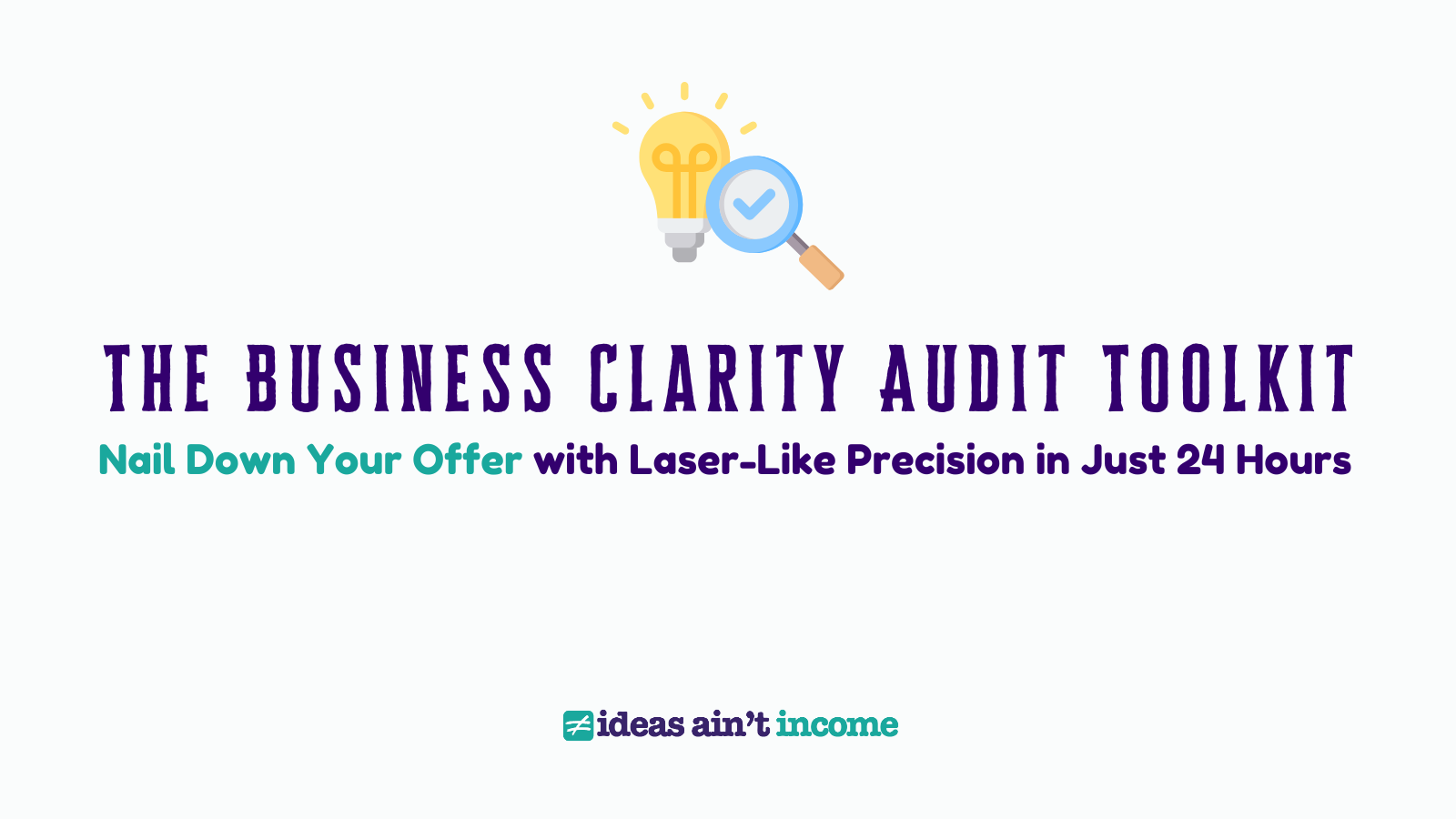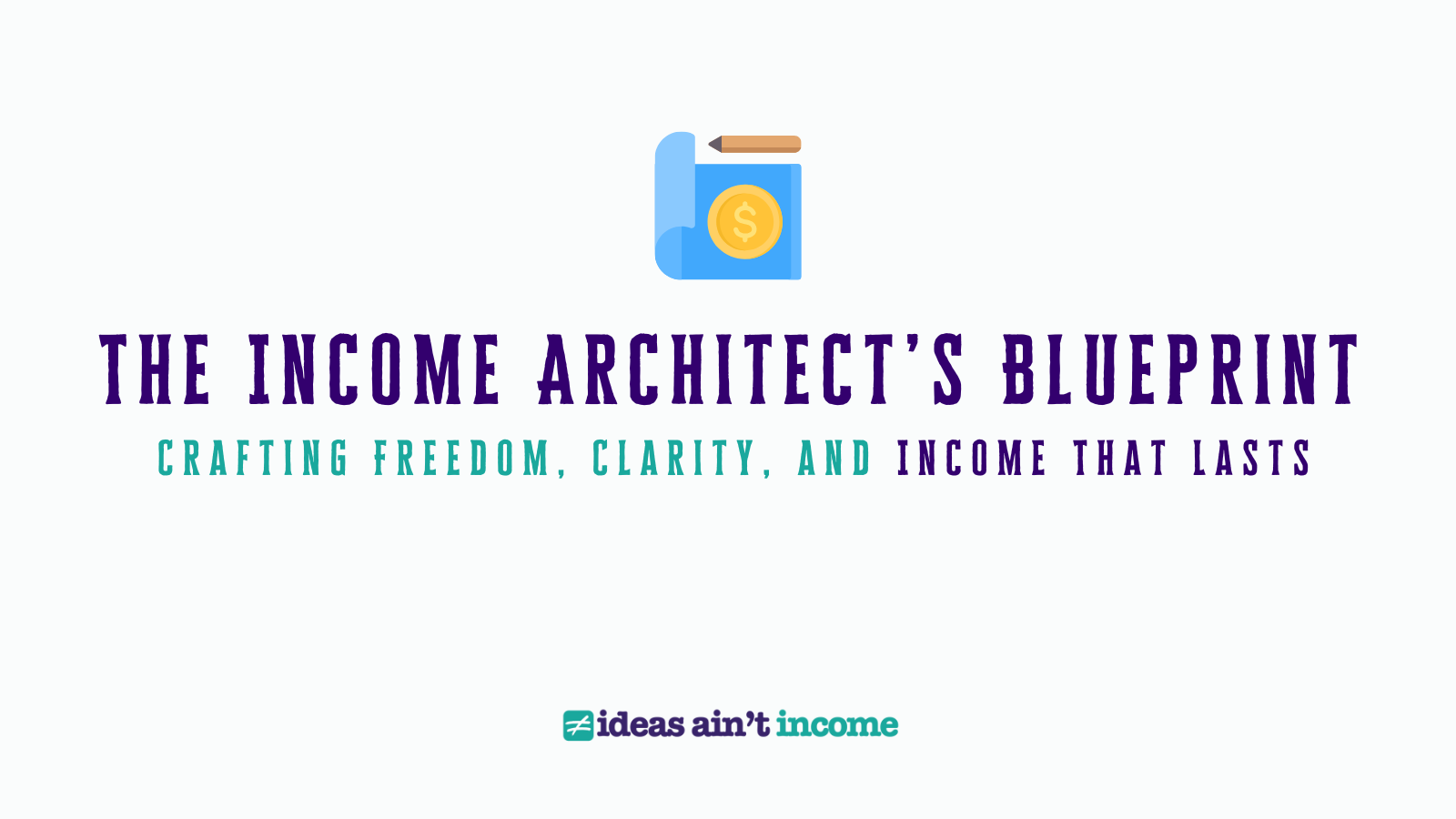The Business Clarity Audit Toolkit: Nail Down Your Offer with Laser-Like Precision in Just 24 Hours 🔍⏳
Dairrick Anthony Jordan • 2024-10-19
As a creator, solopreneur, or freelancer, the biggest challenge isn't lack of ideas—it's clarity. You’re probably drowning in endless tasks, ideas, and possibilities for your business, but not knowing what to focus on is what’s holding you back from growing faster. That’s where The Business Clarity Audit Toolkit comes in.
As a creator, solopreneur, or freelancer, the biggest challenge isn't lack of ideas—it's clarity. You’re probably drowning in endless tasks, ideas, and possibilities for your business, but not knowing what to focus on is what’s holding you back from growing faster. That’s where The Business Clarity Audit Toolkit comes in.
This toolkit isn’t about adding more to your plate; it’s about taking things off it and helping you nail down your offer, streamline your time, and eliminate bottlenecks. In just 24 hours, you’ll have a crystal-clear business plan that puts you on the path to a 5-figure business. No vague ideas—only precision and action.
In this blog post, we’re going to break down the complete and comprehensive, insanely insightful, decadently detailed, astutely actionable user guide for the Business Clarity Audit Toolkit. You’ll walk away knowing exactly how to use each tool to turn your business ideas into a 5-figure reality—in record time.
Why Clarity Matters More Than Anything Else
Before we dive into the tools, let’s talk about clarity. Without it, you can’t grow. Period.
When you’re unclear about your offer, your time, or your process, you end up spinning your wheels, wasting energy on low-impact tasks, and missing out on opportunities for revenue growth. If you’ve been grinding hard but aren’t seeing the results, chances are you lack clarity, not effort.
The Business Clarity Audit Toolkit is designed to fix that. This isn’t about brainstorming or abstract thinking—it’s about execution. You’re going to walk away with a plan that tells you what to sell, who to sell it to, and how to spend your time to make it happen.
Ready to dive in? Let’s get started.
Tool 1: The Revenue Potential Worksheet
Purpose:
To give you a clear breakdown of your income goals and create a roadmap to hit them. This tool takes the guesswork out of revenue planning and shows you exactly what you need to sell—and how much you need to sell it for.
Step-by-Step Instructions:
- Set Your Monthly Revenue Target: Start by picking a clear revenue goal for the next 30 days. This isn’t a time for vague ideas like “I want to make more money.” Pick a specific number—$5K, $10K, $20K, whatever works for your current stage. The important thing is to get clear on what you want to achieve.
- Define Your Core Offer:
Once you’ve set your goal, it’s time to decide on the core offer that’s going to get you there. Your core offer is the one thing you sell that makes the biggest impact. It should be something high-ticket (think $2K, $5K, or even more), because you want to focus on value over volume.
- Ask yourself: What can I offer that delivers massive value and solves a real problem for my ideal clients?
- This could be coaching, consulting, a productized service, or even a high-end digital product.
- Break Down Your Sales Targets:
Now, it’s time to reverse-engineer your goal. Let’s say you want to hit $10K this month. You’ve got two main paths:
- Sell a high-ticket service at $5K, and you only need 2 clients.
- Alternatively, you could sell a mid-ticket offer at $2K and need 5 clients.
Play around with these numbers to see what works for you, but the goal is to make sure your revenue is based on a clear sales target.
- Revenue Streams and Pricing: Use the Revenue Target Calculator included in the toolkit to map out different scenarios. For example, if you offer a mix of services (e.g., 1-on-1 coaching, group programs, and digital products), how many units of each do you need to sell to hit your target?
- Action Step: Write down two pricing structures—one for a high-ticket offer and one for a retainer model (e.g., $2K/month ongoing consulting). These will serve as the anchors for your business model moving forward.
Pro Tip: Focus on ONE core offer that’s proven to work, and don’t overcomplicate it. Clarity is about precision—simplify your offers and aim for maximum impact.
Tool 2: The Time Audit Tool
Purpose:
To identify where your time is being wasted and show you how to repurpose it for high-value tasks that actually drive revenue. This tool helps you regain control of your schedule and focus on what matters most.
Step-by-Step Instructions:
- Track Your Time for 3 Days: Use the Daily Time Tracker Template from the toolkit and start logging your time in 30-minute increments. Be brutally honest—if you’re checking social media for 15 minutes, log it. If you’re bouncing between tasks without getting anything meaningful done, write that down too.
- Categorize Your Tasks:
After 3 days of tracking, categorize everything you did into three buckets:
- Revenue-Generating: These are the activities that directly lead to sales or client work. For example, sales calls, client delivery, and marketing.
- Operational/Admin: These are tasks that have to be done but don’t directly impact your bottom line. Think sending invoices, answering emails, or managing your calendar.
- Distractions: These are time-wasters, plain and simple. Scrolling social media, attending unnecessary meetings, or doing tasks that could be automated or delegated.
- Analyze Your Time:
Now that you’ve categorized your time, look at the balance:
- How much of your day is spent on revenue-generating tasks?
- Are you spending too much time on admin work or distractions?
Ideally, you want at least 70% of your time spent on high-impact, revenue-driving activities. If that’s not happening, it’s time to make some shifts.
- Reallocate Your Time:
For tasks that aren’t driving revenue, ask yourself:
- Can I automate this? (e.g., use tools like Zapier or Asana to handle repetitive tasks).
- Can I delegate this? (e.g., hire a VA to handle admin work or client communication).
- Can I eliminate this? (e.g., stop spending hours on tasks that don’t align with your revenue goals).
- Action Plan: Based on your analysis, create a new weekly schedule that prioritizes revenue-generating tasks. Block out chunks of time for high-value work and set boundaries around distractions.
Pro Tip: The more time you free up for high-impact tasks, the faster your business grows. Cut out the distractions and double down on what moves the needle.
Tool 3: The Bottleneck Checklist
Purpose:
To identify the bottlenecks in your business that are holding you back from growth. This tool is designed to help you find the gaps in your process and fix them fast.
Step-by-Step Instructions:
- Map Out Your Business Stages:
Every business has key stages. These are the areas where things can either run smoothly or get stuck. Start by mapping out these stages:
- Lead Generation: How do you attract new clients?
- Sales/Conversion: How do you convert leads into paying clients?
- Client Delivery: How do you deliver your services or products?
- Retention & Upsell: How do you keep clients and get them to buy more?
- Rate Each Stage (0-10):
For each stage, rate how optimized it is on a scale of 0-10 (0 = completely blocked, 10 = running smoothly). This rating will help you identify where your biggest bottlenecks are.
- Lead Gen: Are you struggling to get consistent leads?
- Sales: Are you closing enough deals to hit your revenue goals?
- Delivery: Are you spending too much time on client work, leaving no room for growth?
- Retention: Are you retaining clients and upselling them into higher-ticket services?
- Identify Bottlenecks: Look at the stages with the lowest ratings—these are your bottlenecks. For example, if you’re struggling to generate leads or your sales conversion rate is low, that’s where you’re stuck.
- Fix the Bottlenecks:
For each bottleneck, pick one action that will solve the problem:
- Lead Gen Bottleneck: Implement a new outreach strategy, run paid ads, or create a lead magnet.
- Sales Bottleneck: Optimize your sales process—refine your sales page, improve your pitch, or tweak your pricing.
- Delivery Bottleneck: Streamline your process with automation or hire help to free up more of your time.
- Retention Bottleneck: Set up automated follow-ups, offer retainer packages, or upsell clients into new services.
- Action Plan: Choose one bottleneck to focus on for the next 7 days. Fix it, then move on to the next. Don’t try to fix everything at once—start with the bottleneck that has the biggest impact.
Pro Tip: Bottlenecks are opportunities. Fixing just one can unlock massive growth, so tackle them one at a time.
Bringing It All Together: Your 24-Hour Action Plan
By the end of these 24 hours, you’ll have:
- A revenue plan with clear goals and pricing structures.
- A time audit that shows where your time is being wasted and how to reallocate it for maximum impact.
- A bottleneck elimination strategy that identifies and fixes the gaps in your business.
This is how you go from vague ideas to laser-sharp execution. You’re not just thinking about your business—you’re building a system that generates revenue, drives growth, and moves you closer to a 5-figure income.
Final Takeaway: Clarity Leads to Cash
At the end of the day, clarity is the fastest path to cash. The more precise you are about what you’re offering, how you’re spending your time, and where your business needs improvement, the faster you’ll grow.
The Business Clarity Audit Toolkit isn’t just another set of worksheets—it’s the roadmap you need to turn ideas into income. If you follow this process, in 24 hours, you’ll have a crystal-clear action plan that sets you on the path to a 5-figure business.
Now it’s time to take action. Don’t just read this blog—execute the steps and see how quickly things start to shift in your business. Because when clarity meets execution, that’s where the magic happens.



